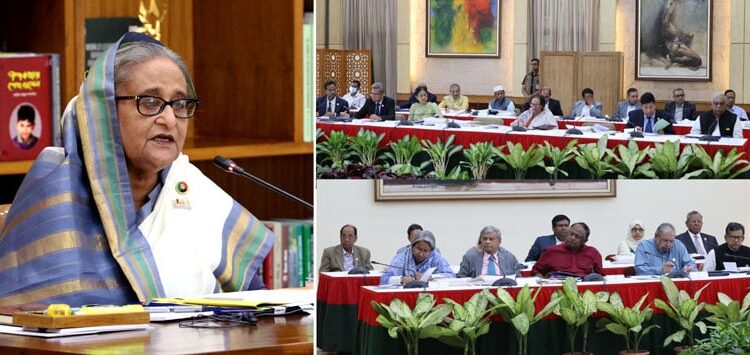POBNEWS24, Dhaka, Apr 2, 2023: Prime Minister Sheikh Hasina today laid emphasis on exploring overseas employment opportunities in new countries and sending skilled workforce there, urging expatriate Bangladeshis to send remittance to the country through legal channels.
“We have to find new employment areas and new countries (for sending workforce). We will arrange befitting training (for the workers) that a country needs,” she said.
The Premier said this while delivering the introductory speech at the second meeting of the national steering committee on expatriates’ welfare and overseas employment at her official residence Ganabhaban.
Mentioning that the government has already started sending workers to a few new countries, she said “We have to send skilled workforce and that is why we’ve arranged multipurpose training facilities for our workers.”
“If we can send skilled workforce through proper training, we have a big opportunity to attain economic solvency,” she added.
She also asked the officials concerned to look into the matters so that Bangladeshi expatriate workers stay well and encourage them to send remittance using legal channels.
The Prime Minister said if remittance is sent through “hundi”, the money might go to someone else (it may be family members) and they may spend it, resulting in no saving here for the sender.
She added that sometimes the remitted money also gets misused.
“Many of the expatriate workers after returning home find that there is no money in the country what he had sent. And many have to undergo this kind of problem,” she observed.
To this end, Sheikh Hasina said that her government has given incentive on the inward remittance if it is sent using the banking or legal channels.
Mentioning the establishment of the Probashi Kallyan Bank by her government, she directed the bank authorities to extend the facilities, by appointing agents where there is no branch of the bank, so that the expatriates could send remittance easily staying at their place of residence.
“If you (expatriates) send money through banks, you will spend as much as you need and the rest will be saved,” she said, adding: “You can use this saving after returning home.”
The head of government said if money is sent using “hundi”, it will go to another hand, but there is no such possibility in the bank.
She also said that the expatriate workers after returning home can take loan from the bank along with their savings money.
The Prime Minister directed the officials concerned to carry out massive awareness campaigns to this end.
She also put emphasis on the necessity of building awareness so that people do not fall into cheating while going to overseas work and get proper employment.
In this regard, she said her government has set up digital centres across the country and the overseas job-seekers can register themselves to the expatriates’ welfare ministry by visiting the centres.
“If they (overseas job-seekers) go abroad with appropriate training, they would not fall into danger,” she said.
About the female workers, Sheikh Hasina said those going for overseas employment with proper training following the proper way remain well but those who fall into the clutches of middlemen are facing sufferings. She urged everyone to become aware about this.
Referring to the learning and earning campaign launched by the government for the freelancers, she said that now the country has started to yield the result of it.
She said the freelancers are bringing foreign currency to the country staying home, which was not in calculation earlier.
Sheikh Hasina said that at present there are sufficient employment opportunities in the country and people are earning more.
She mentioned that a day-labourer who used to earn Taka 200-300 per day in the past, now can earn Taka 600-1000 per day depending on the nature of work. The minimum earning is Taka 500-600.
Earning in the rural areas is higher than this amount, she said, adding that during the paddy harvesting season the amount is Taka 700-800 with three meals a day.
“The rural economy has improved a lot. If anyone goes to rural areas it will be seen that the standard of living there has improved a lot,” she said.
Sometimes scarcity of labour is also seen as people are becoming solvent, she added.







